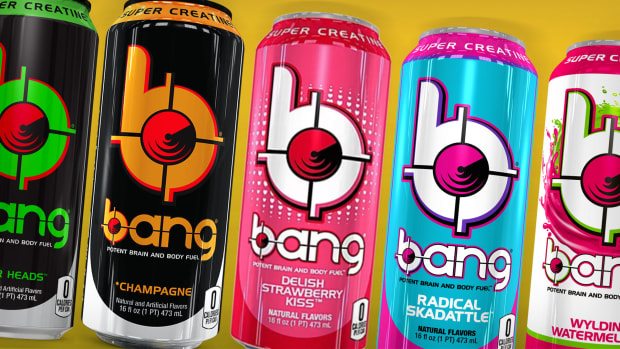Energy drinks occupy a unique space in the beverage category. They're not just something people drink for pleasure or to get hydrated, they may also fill those roles, but they also make promises about helping athletic performance, recovery, and even weight loss.
To say those claims are dubious at best puts it mildly, but the energy drink business is booming, led by Coca-Cola (KO) backed Monster Beverage (MNST). While Coke owns under 20% of Monster, the partnership has been a strong one that has helped the brand make inroads at grocery and convenience stores.
It looked like Coke and Monster had created a recipe for success that could be duplicated. PepsiCo. (PEP) certainly thought some version of that deal would work for it as in April 2020 it entered into an exclusive deal to "distribute the portfolio of Bang Energy beverages in the United States," the companies shared in a press release.
"In the ultra-competitive energy category, Bang Energy has thrived, pioneering the performance energy segment and attracting the next-generation of energy consumers," said PepsiCo Beverages North America CEO, Kirk Tanner. "This alliance plays a central role in PepsiCo's overall energy-beverage strategy and enables us to significantly accelerate the distribution of Bang Energy to meet rising consumer demand."
That all proved to be wishful thinking as Bang and PepsiCo have ended their deal and Bang's parent company has filed for bankruptcy.

Bang Energy/TS
Bang Fails to Equal Monster, Red Bull
Store shelves have become crowded with energy drinks. Alongside Monster, Red Bull, and Bang, there are seemingly dozens of others with names a lot like Bang trying to win market share. Add in the coffee-fueled beverages that also add some special ingredients that energy drink companies say produce their magic effects, and it's very hard to get any attention.
When the Pepsi deal was signed Bang was on an upward trajectory and it seemed like it might reach escape velocity and stand out from the pack. That has not happened as Vtal Pharmaceuticals, Inc. has filed voluntary petitions for protection under Chapter 11 of the Bankruptcy Code in the Southern District of Florida.
The good news for Bang fans is that the company does intend to keep operating. Vital has taken in $100 million in outside financing to work its way through the bankruptcy process.
Bang Has a Plan to Take on the Energy Market (Without Pepsi)
Like many marriages, the PepsiCo and Bang deal started off with optimism and the hope that combining forces would make both sides better. That's not what happened, according to Vital.
VPX/Bang Energy intends to reclaim the formidable market share that dwindled while Pepsi was the national distributor of Bang energy drink products. Immediately prior to VPX/Bang Energy switching to Pepsi in early 2020, Bang’s share of the energy drink market was roughly 9.7%. Under Pepsi’s distribution, roughly 3.4% of that market share was lost. At $200 million per share point, that equates to $680 million in today’s energy drink market.
To replace that deal -- the one the company essentially accuses PepsiCo of neglecting -- Bang Energy plans to create a whole new direct store distribution network covering nearly 95% of the entire United States market. That launch is happening "soon," according to the company.
“The primary objective of our new DSD network is to regain the massive market share we earned prior to Pepsi and continue to achieve double-digit growth and progress vigorously beyond 20% market share in energy drinks,” said VPX CEO Jack Owoc. Bang Energy’s new DSD network will launch nationwide and be closer to 100% as it officially completes its exit from the Pepsi relationship this month. This will be a comprehensive transition with no impact to product availability."







